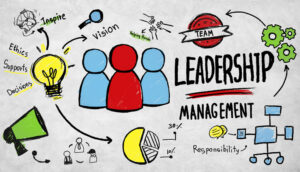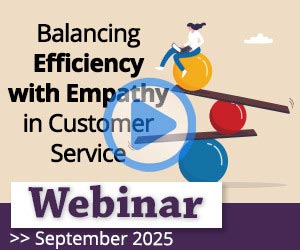The term ‘soft skills’ typically refers to personal attributes and interpersonal skills that enable effective communication, collaboration, and problem-solving in the workplace. But some are more important than others.
So which soft skills really make the difference between an average leader and a great one? Our Editor – Megan Jones – spoke to customer experience experts Dan Pratt, Dara Kiernan, Jeremy Watkin, Kim Ellis, Naomi Smith, and Vinay Parmar to find out.
Self-Awareness (and Keeping Calm Under Pressure)
Good leaders bring self-awareness to the table every single day and are mindful of how their actions and even attitude have a ripple effect across their team.

“As a leader, self-awareness comes down to being mindful not just of what you’re saying, but how you’re saying it and how that’s landing, as well as the time and attention you’re actually giving your team, and how mindful you’re being of their needs.
If you’re self-aware of the effects of your actions on the team, then that’s going to set everyone up for success, isn’t it?” – Dan Pratt, Founder & Director of DAP Consultancy
This extends to being able to keep calm in a stressful situation – instead of flying off the handle when something happens.
Good leaders even follow the WAIT acronym, which stands for “Why Am I Talking?” and helps leaders practise that, when pressure comes, it’s not the person who talks first that wins out, but rather the person who sits back and thinks things through – before opening their mouth in a calm and considered way.
Patience
Patience is another soft skill that can be practised in lots of different ways. For example, giving agents the time and space they need to talk and express themselves during a 1-to-1 (instead of rushing and/or talking over them), as well as understanding that not everyone will pick up new things in the same time frame.
So, this patience should also extend to making allowances for mistakes and personal growth.

“It’s so important for leaders to practise patience with everyone in their team, especially when rolling out new systems and processes.
Not everyone’s going to get it on the first try, are they? Good leaders allow for that and don’t make a big deal of it.
If you’re the manager always saying “Why can’t you just do it like everybody else?”, it’s a lose–lose situation.” – Kim Ellis, Chief Learning Architect at Go Ginger Learning Solutions
This patience also extends to taking a calm and considered approach to decision-making – including not making assumptions or jumping to conclusions, as this can also cause more issues down the road.
Staying Focused
Good leaders have the knack for staying focused too! And they don’t let themselves get dragged down by the minority of the troublemakers either!

“I think a great way to put the spotlight on the importance of staying focused on what really matters is to use an analogy with comedy.
If you spend too much time dealing with hecklers in your club, you’ll just end up with a room full of hecklers and all your good audience will have disappeared.
After all, if you’re not paying attention to your great people and too busy managing the troublesome ones, that’s all you’ll be left with!” – Dara Kiernan, Leadership Development and Contact Centre Consultant
Curiosity (Especially When It Comes to Receiving Feedback)
Great leaders also have an open, positive, and curious attitude towards receiving feedback, so they can continuously refine their leadership style.
“It’s hard for anyone to swallow feedback that they don’t like, but it’s so important not to see it as a criticism – instead to reframe it as an opportunity to improve.
You don’t have to agree with every piece of feedback, or even do anything with it, but you always need to receive it well, and that’s a soft skill every leader needs to practise.” – Vinay Parmar, Managing Director at Customer Whisperers Limited
As award-winning consultant Andy Bounds also shared in his recent newsletter, when it comes to feedback, you can choose to be curious or furious:
- Curious – “I hadn’t thought about it like that. Please help me understand why you say that …”
- Furious – “No, you’re wrong because …”
To help bring this to life, here is a real-life example of the value of being curious from Vinay Parmar:

“In one of my early leadership roles, we had an open-plan office and in the middle was a channel that you could walk down. So, every day, I would walk down the middle and turn around and say “good morning” to everyone. At least that’s what I thought I was doing.
But then, we did a 360-feedback exercise on the leadership team and I got a really low score on team engagement. I was really confused, as I felt like I was putting the effort in.
However, I was curious enough to look at some of the results and quickly realized that, unconsciously, as I walked, I was only turning to one side of the room to say “good morning” – so the other half of the room felt completely ignored. Every day! Needless to say, it was hard feedback to hear, but I took it on board and adapted my approach after that.”
Approachability
Another area where good leaders excel is in how approachable they are.

“Good leaders make time for their colleagues, plain and simple, and conduct themselves in a friendly and approachable way.
Often, this soft skill is supported by a culture of openness and honesty across the contact centre and even the wider company, where people don’t pull rank and decide they’re “too busy” to interact with anyone below their paygrade.” – Naomi Smith, Contact Centre Manager at Worcester Bosch
Listening
The “two ears, one mouth” rule exists for a reason! Listening is just so important!
Although it’s a bit controversial to admit, you don’t even have to care all that much about what your team are saying (if genuine interest doesn’t come naturally to you), but you do still have to make people feel that you are listening and that you care! It’s all about perception!
“I worked with someone once who didn’t care all that much about his team, but everybody still felt that he cared about them – as he had the emotional intelligence to see the value in showing that he was listening to get the buy-in he needed from his team.” – Dara Kiernan, Leadership Development and Contact Centre Consultant
Empathy
Finally, don’t overlook the need for empathy!
Too often, it’s practised with customers over the phone and then forgotten the minute the shift ends, but the best leaders know it’s needed for agents and customers alike.

“Empathy is just so important. It’s too easy for a leader to respond to yet another short-notice annual leave request with a grumpy “fine”, when really they should be diving in to say, “you’ve been missing a lot of work lately, is there anything I can help with?”
These are moments where a bit of empathy goes a long way, so it really shouldn’t just be a soft skill that agents use on the phones.” – Jeremy Watkin, Director of Customer Experience and Support at NumberBarn
If you want to understand the benefits of empathy in leadership, read our article: How to Limit Agent Burnout With Empathy-Led Leadership
Which Soft Skills Have Helped You Succeed as a Leader?
Click here to join our NEW Readers Panel to share your experiences and feature in future Call Centre Helper articles.
With thanks to the following people for sharing their thoughts for this article:
- Dan Pratt, Founder & Director of DAP Consultancy
- Dara Kiernan, Leadership Development and Contact Centre Consultant
- Jeremy Watkin, Director of Customer Experience and Support at NumberBarn
- Kim Ellis, Chief Learning Architect at Go Ginger Learning Solutions
- Naomi Smith, Contact Centre Manager at Worcester Bosch
- Vinay Parmar, Managing Director at Customer Whisperers Limited
For more advice on improving and developing your contact centre leaders, read these articles next:
- 23 Things Every Contact Centre Manager Needs to STOP Doing
- Top Reads to Boost Your Contact Centre Leadership Skills
- How to Prioritize Leadership Training
Author: Megan Jones
Reviewed by: Xander Freeman
Published On: 12th Nov 2025 - Last modified: 19th Nov 2025
Read more about - Skills, Dan Pratt, Dara Kiernan, Editor's Picks, Jeremy Watkin, Kim Ellis, Leadership, Naomi Smith, Skill Development, Soft Skills, Team Management, Top Story, Vinay Parmar
















